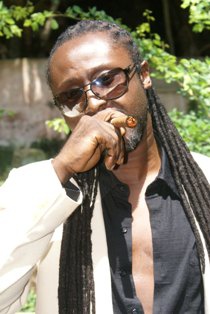
By Oral Ofori
The Genesis
Reginald Ossei; also known as Reggie Rockstone, the creator of hiplife, a Ghanaian music genre which is a fusion of authentic Ghanaian lyrics with a mixture of traditional Ghanaian language and hip-hop instrumentals believes Ghana music has not done enough justice to HipLife as a genre. To right this wrong, Reggie is about to embark on organizing the first ever hiplife music awards in Ghana.
The Godfather of hiplife believes as the inventor of the genre, no one is better placed to talk about and judge this style of music better than the one who started it— himself. Hiplife is akin to the hip-hop movement which begun in the United States. Reggie lived through and experienced this movement as a young person as someone born in the UK who spent his growing up life in New York too. Today he however feels this style of music all though growing and evolving rapidly has not been properly defined.
Hiplife's 'Grandpapa' as he's sometimes affectionately called started out as a musician and member of a youth group that was based in the UK called PLZ (Parables, Linguistics and Zlang) with Fredi Funkstone, Jay (both from West Africa) & DJ Pogo of the UK. The group traveled the globe doing performances of hip-hop. Trying to define the hiplife genre, Reggie says 'somethings are certainly obvious; the glitz and glam, the bling culture, the gangster talk and swagger amidst the 'bootylicious' girls, dance and bravado-style video clips which is seen in American hip-hop music is definitely represented in Ghana's hiplife with the absence of the gangsterism which is characterized by violence'.
While touring the world in his hey days, Reggie's talents got noticed in Ghana in the early 1990's, which prompted the Ghana cultural community to invite him to perform at Panafest; a cultural arts and musical festival organized in Ghana and featuring African musical and cultural ambassadors in and outside the continent. This event gave Reginald the opportunity to perform to over 50,000 people in Ghana and that to him was one of his greatest audience.
This invitation to Panafest was what lead to the actual birthing of hiplife. Today the maestro is proud about the growth and spread of hiplife with Ghana as its seed and the entire African continent as its nursery ground. Across the African continent today, musicians have started mimicking hiplife with tons of young artistes rapping in their native tongues to hip-hop styled music videos and beats.
Hip-hop is the underlying structure of hiplife and for someone who wasn't born in Ghana, Reggie realized that there was a disconnect between the older and younger music generation in the country before the advent of hiplife. Back then, the older generation was confused by the emerging music scene which saw a younger generation of Ghanaians listening to American rap music with foul words that the seniors wouldn't listen to in their days.
Music video: 'We glad' with Reggie Rockstone featuring 2 Face of Nigeria, Wyclef of the USA and Kwaw Kese of Ghana: http://www.youtube.com/watch?v=3WgQXtnHUpg
Forming a bridge over this musical gap between the young and old became dire for Reggie Ossei. Presenting the gangster style lyrics in the local Ghanaian dialect with words and instrumentation that were decent and acceptable to the seniors and at the time that provided an avenue for the youth to also see imitations of hip-hop culture and videos all bundled up in a language that every one could directly connect with was an uncharted area he felt the need to urgently explore, hence the entrance of hiplife into the Ghana music scene.
With this burning desire to evolve this new genre, Reggie Rockstone in the company of friends like Pangie and Freddy FunkStone who were all free styling to hip-hop beats begun wondering what a freestyle done in 'Twi'; the most widely spoken Ghanaian dialect and Reggie's native tongue, would sound like. The young musicians at the time decided to give it a try and liked what they ended up creating.
After their successful experimentation, the young Rockstone wrote more verses and rhymes in 'Twi' and his father, the late Saint Ossei, a prolific fashion designer in Ghana at the time, begun encouraging and asking him to brand this style as it had the potential to become something explosive.
He took the advice and support of his late father and begun to nurture hiplife in a language that he and his late father called 'TwiGlish'; a hybrid of the 'Twi' dialect from Ghana and the English language. After his inability to find a producer for his first album and being criticized by people who felt his attempt was an invasion of the Ghanaian culture by hip-hop, Reggie's father decided to become his son's sponsor by providing a lot of the finances the led to the creation of the world's first hiplife album. They also embarked on what Rockstone calls 'the unintentional greatest branding technique in Ghanaian music history—hiplife!'
The first ever hiplife product was the album titled 'Makaa maka' (available on iTunes: https://itunes.apple.com/us/album/makaa-maka/id297229627) that was released in June of the year 1997. Makaa maka is the Twi saying for 'I said it because I said it'. This album received rapturous welcome based on the 'in your face-style attitude' the lyrics and rhythm had. The album blazed the trail for others to follow in years to come not just in Ghana, but on the entire African continent. Find out more about this first ever hiplife album in my next blog.
Oral Ofori, +1202-706-9881, oralofori@gmail.com, Freelance Writer ( www.oralofori.blogspot.com), Wikimedia Ghana Enthusiast, Broadcaster, Retail Specialist, Music Promoter, Artiste. http://about.me/oralofori/